A White Guy’s Guide to Traveling to China for Business
Traveling to China for the first time as a Westerner can be daunting (the title says “White guy” but really this post applies to any non-Chinese person of any gender). I know the first time for me it was a scary proposition. I'll give you some basic tips and tricks for traveling to China.
Planning Your Itinerary
China is huge (as I reiterate later in this article) and you have to plan your trip accordingly. If you are traveling from North America, you will lose a day going there, meaning if you leave from Los Angeles at 12:30pm on Friday, you will get there approximately 2:30pm on Saturday (approximately 11 hour travel time). If you're like me, during your first day or two you will essentially be a walking zombie due to jet lag, meaning you'll lose at least a couple of days. Subsequently, I recommend booking your trip for 9 days minimum (i.e. leave on Friday night, come back two Sundays later).
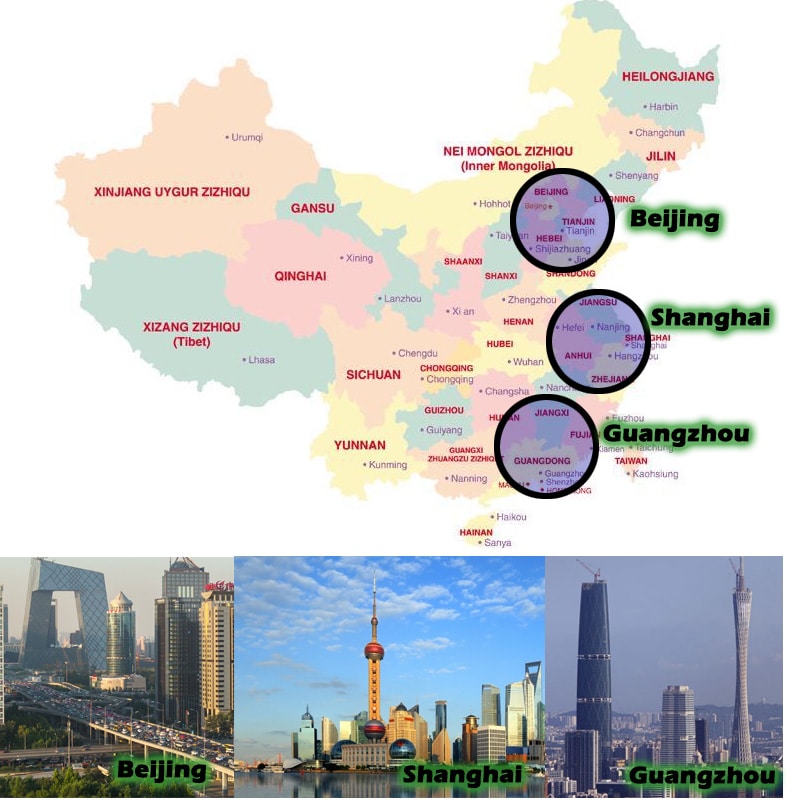
Almost all international flights will fly into either Beijing, Shanghai, or Guangzhou. Make one of these regions your base for visiting Suppliers. If you try to visit Suppliers in too vast of a region you'll likely run into serious time problems and get burnt out.
If you're planning to visit a number of Suppliers while in China, plan conservatively. Your Supplier's factory is likely to be 2-3 hours by car away from a major city center. This means you'll stay in a major city, like Ningbo, but you will lose 4-6 hours in travel time to see their factory. In other words, it's very difficult to see more than one Supplier in one day (especially after you take into account the long meals they'll want to treat you to), so do not travel to China for 9 days and plan to visit the factories of 15-20 potential Suppliers. Rather, aim to see 3-5 potential Suppliers. If you plan to meet with a ton of Suppliers, trade shows are useful because everyone is gathered at one central point.
Costs
China isn’t quite the bargain it once was but it is still cheap. For Western 4 and 5 star Hotels in Beijing or Shanghai the prices are the same as nearly any major Western city. In most of the major Chinese cities, you’ll pay less for a respectable 4 star hotel. In some of the smaller cities, things get pretty cheap- in Dongying I stay at a Chinese 5-star hotel for about $60.
Food is normally very cheap. Excluding the nicest restaurants, $5-10 per meal is a good estimate.
Transportation, especially in terms of subway, long distance bus and train travel, is very cheap. The bullet train from Shanghai to Beijing is around $100. The subway, on average, is $0.50. Taking a long distance bus between two cities rarely exceeds $50.
Keep in mind that if you're visiting a Supplier they will almost certainly pay for all your meals and your transportation to your next destination. They will probably offer to pay for your hotel as well, but read on for a warning about this.
Overall, if I'm traveling for two weeks and staying in 3 cities, I budget approximately $150 per day for everything, including hotel but excluding air fare from Canada. This is living fairly well. If you're on a tight budget, you avoid the major cities like Beijing and Shanghai, and you stay in Chinese Hotels, this number can be well below $100.
Visas
You need a visa to travel to China. Recently, China enacted a 72-hour visa free program for transit passengers going through China. Unless you know for certain this pertains to you, ignore it and assume that you will need a visa.
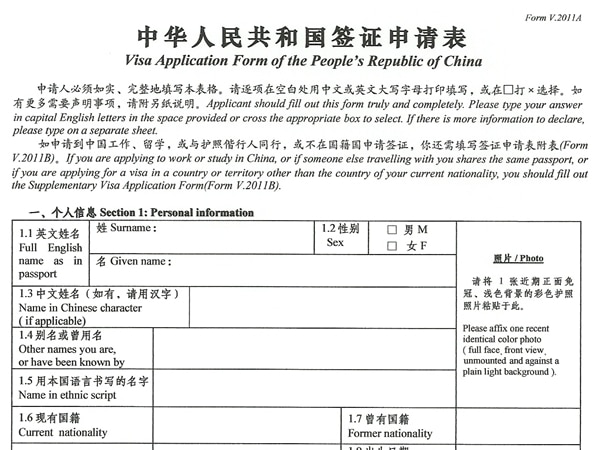
Check with your local consulate or visa application office for an up-to-date form.
The visa form will ask you several intimidating questions like the name of your inviter, whether you plan to travel to Tibet, etc. I've applied for no less than a dozen visas for myself and others and I've never had so much as a question asked about any application I've filled out. If you're from a Western country with a European sounding name, you're likely to get similar results.
Information on Inviter
I've always simply put the hotel I am staying at. This does not need to be a formal invite- just the Hotel contact information should suffice.
Your Itinerary
You can be vague. Something like “Shanghai, Beijing, and Qingdao” suffices. Don't worry if your itinerary is not fixed. The visa authorities are basically looking to see that you do not say Tibet or Xinjiang (if you plan to go to either of these two provinces, you are best to forget to mention this).
Purpose of Trip
If you plan to visit a couple of trade shows while you're in China or visit a supplier (technically business activities), again, you're best to simply put “Tourism”.
Pay a Visa Service to Save Yourself Time
Given the vast size of the Chinese diaspora, Chinese visas are amongst the most popular visas applied for. If your city has a travel agency specializing in Asian travel, they almost certainly have experience with Chinese visa applications and will charge a nominal fee of $20-50 to submit it for you. Any Chinese owned travel agency can also probably help.
Even if you have a Chinese consulate in your city, there are often long line ups, and you have to go back and forth to drop off and pick up your application/visa. Using a visa assistance service saves you this time.
Be Careful Specifying Your First Date of Entry
When you apply for your visa, you will be given a 6 month range for when you must first enter the country. If you state your first date of entry will be May 15, you may not be allowed to enter prior to this. Chinese officials seem to be getting better and make your first date of entry 30-days prior to your stated first date of entry to allow some flexibility; however, you're best to pad your intended date of entry by at least a few days (i.e. instead of saying May 15, say May 10).
Booking Your Hotel and Accommodation
I book all of my hotels through c-trip.com. They list almost all of the major hotels in all Chinese cities, including both Western and Chinese hotel chains. They take a small commission (~20RMB) and also charge a 3% service charge to use credit cards.
When booking your hotel, be warned that there's a big difference between Chinese Hotels and Western Hotels: There's a sizable difference between a 5-star Jingli Hotel and a 5-star Ramada Hotel in China. Chinese chains might have similar amenities to Western hotels but will often also feature hard beds, Chinese smoking everywhere, “ladies” calling your hotel room at night, and limited English speaking staff. You can easily end up in a Chinese 5-star with not one other Westerner.
If it's your first visit to China, I recommend booking your first couple of nights at least in a Western hotel. Western hotels tend to be comparable in price to what we pay in the west ($120-200US/night). You can get some very good deals on 4 and 5 star hotels in China (under $50US often). Be very wary of Chinese 3-Star Hotels and below.
Booking Domestic Internal Travel (and be warned: China is a Big Country)
Again, I book all of my plane travel through c-trip.com.
If you're planning to visit a supplier in Guangzhou and Beijing, remember that there is is over 2000 kms between those two cities. Aside from potential travel time, different regions in China can have significant cultural and language differences. It's one of the reasons why when I'm looking for potential Suppliers, I like to try and keep them all in the same province whenever possible.
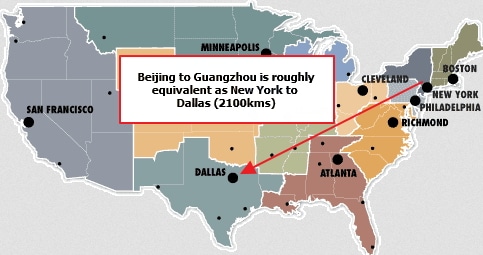
Flights in China are relatively cheap, and rarely no more than $200US for a flight.
China has an excellent rail system and it is quickly becoming amongst the best in the world. Train travel is too broad of a topic to cover completely here, but seat61.com is an excellent resource for China train travel. Briefly though, there are high speed bullet trains connecting many of the most popular routes such as Shanghai-Beijing, Shanghai-Hangzhou, Beijing-Xian, etc. The high speed bullet trains are almost always more convenient and comfortable than flying. They're comparable in price and time to flying (once security checks et al are taken into account). The downside is that China train systems can be an adventure, overwhelming, and not nearly as Western friendly as flying.
Foreigners are severely restricted from driving in China (and you really wouldn't want to anyways unless you're suicidal). However, one of the things I like about traveling in China compared to other developing countries is that taxis are cheap and quite legitimate, i.e. they use meters and most drivers will not take advantage of foreigners. The downside is that taxis can be difficult to get (especially when it's raining!).
Getting Your Supplier to Help with Accommodation et al
If you have a somewhat established relationship with your Supplier (ordering thousands or tens of thousands of dollars worth of goods a year) your Supplier will likely be happy to help book your accommodation for you if you ask. Be careful of this. If you're a relatively small customer, your supplier will book you in relatively cheap accommodation in a Chinese Hotel. This is why I normally book my own accommodation.
However, your Supplier will gladly offer to pick you up from the airport or train station and drop you off upon departure, which you shouldn't turn down (and they probably won't let you turn it down anyways). This is a huge convenience and makes traveling in China more enjoyable.
The Great Firewall
You're probably aware that internet censorship in China is quite severe. You might already know you can't search for things like the Dalai Lama but there are more relevant sites (especially for business travelers) that China blocks, specifically anything Google (including Gmail). Here are some popular websites blocked as of March, 2015:
- Nearly anything Google (including Gmail, Youtube, etc)
- Dropbox
- Any adult websites

If you're like me, you might actually embrace being without Facebook for a week or two but you rely on Google. In this case, you should buy a VPN proxy service like Panda Pow. This software installs on your computer and allows you to surf any website in China for about $9/month (no long term commitment required). It's a life saver.
Pollution
You've also likely heard of the pollution problems China is experiencing. This pollution is very much real. It will affect you mostly in terms of smog. When you first arrive in Shanghai, Beijing, or Guangzhou, you will have a tickling in your throat and a large mucus buildup. You'll think you're getting sick. Never fear- you're simply getting a case of “Beijing Cough“! (Don't worry, it'll go away after a few days).
Language Troubles
China can be a very difficult country to travel in because of the language issues. This problem stems not from the fact they speak a different language (many of us have traveled in countries where English isn't the main language) but because the written Chinese language is in umm, Chinese. It is almost impossible to decipher any Chinese characters without lengthy analysis and comparison.
Thankfully, all street names are in Chinese script and Roman alphabet. However, that's basically where it ends. Store signs, restaurant menus, product labels, etc. are normally in Chinese exclusively. Compounding things, many Chinese, especially older Chinese, do not understand the Romanization of Chinese into pinyin. This means if you are taking a taxi somewhere, you need to have someone write the address for you into Chinese.
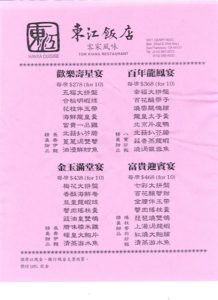
The best tip is to have a few set phrases translated into Chinese and stored in your phone that you can point to, i.e. “I want fried rice and chicken”. Better yet, have a translation app on your phone that doesn't require 3G/Wifi connectivity.
Questions about Itineraries, Visas, or…?
If you have any questions or comments regarding setting an itinerary, getting your visa, or anything else, comment below!
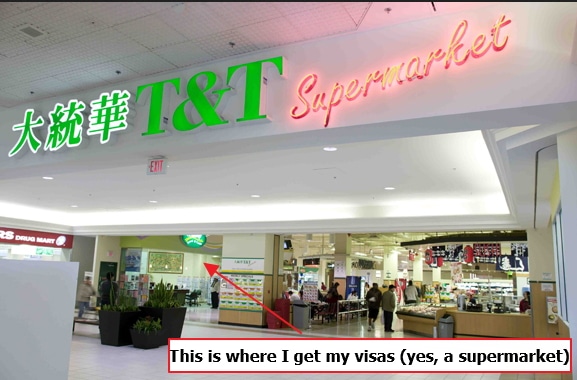




visa question! My husband needs to visit suppliers in China for work and needs to get a temp work visa. Long story short, my husband has a criminal record (felony dui) from 11 years ago (he’s been sober since, yeah!) but thinks this will disqualify him from getting a visa. This isn’t something he wants to disclose to his employer either. Any idea how extensive the background check is? Possible that they only need criminal history for specific time frame (5 yrs, 10 yrs)? Thx, your post is super helpful for planning the trip (if he can)!
I’m not sure how extensive the background check is but either way it’s going to likely involve lying on a visa application which is a big big big no-no.